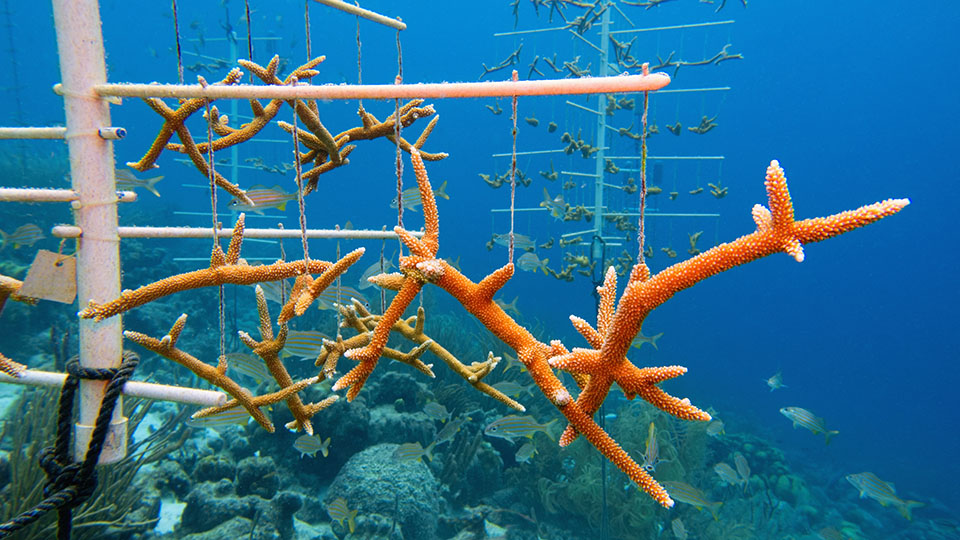

June 18, 2025
As the 2025 UN Ocean Conference convenes in Nice, France, to accelerate action for Sustainable Development Goal 14 (Life Below Water), a virtual side event co-hosted by the World Intellectual Property Organization (WIPO) brought together experts from across the UN system and the private sector to highlight the indispensable role of innovation and technology in safeguarding our oceans.

Organized in collaboration with the UN Climate Technology Centre and Network (CTCN), UN Water, and the UN Development Programme (UNDP), the event, titled “Innovation and technology for better oceans health” showcased tangible technological solutions addressing critical issues from coral reef degradation to sustainable fisheries and flood protection.
Peter Oksen, Senior Green Technology and Research Manager, WIPO, emphasized the need for thousands of diverse solutions rather than a single “silver bullet.” He underscored the importance of a holistic approach to deploying technologies in coastal zones for example though Integrated Coastal Zone Management, and showcased how WIPO GREEN facilitates technology matchmaking to address climate change challenges.
Heather Jacobs, Climate Technology Expert, WIPO, highlighted WIPO GREEN’s role as a “technology liaison” in various acceleration projects. Jacobs also highlighted that technologies such as 3D mapping, remote sensing, and GPS offer promising avenues for conservation. Mahezabin Helal Natasha, Green Technology Expert, WIPO, further elaborated on the impact of technology in fisheries and aquaculture, particularly how technological development in aquaculture are contributing to relieve pressure on wild fish populations.
Ariesta Ningrum, Director, UNCTCN, showcased CTCN’s core services of technical assistance, collaboration, and knowledge sharing. Danny Nekitel, Manager, Mitigation and Low Carbon Growth, Papua New Guinea NDE to Technology Mechanism, presented findings of an on-going project in Papua New Guinea which utilizes water kinesity to generate energy, demonstrating on-the-ground technological implementation.
Mary Matthew, UNDP Ocean Innovation Challenge (OIC) presented OIC as an initiative that identifies, finances, advises, and mentors innovative solutions. Matthew noted that OIC Incubator offers tailored mentorship, technical management reporting, and crucial connections to capital.
Luis Lombana, CEO, Ficosterra, and OIC beneficiary, shared his work on a sustainable seaweed-based fertilizer piloted in Morocco and Mexico which offers environmental benefits through reduced chemical fertilizer use and CO2 emissions, while also increasing crop yield.
Shannon Hardisty, Indonesia Strategy Lead, International Pole & Line Foundation, another OIC beneficiary, also showcased an off-grid solar-powered icemaker, reducing carbon emissions and plastic waste while improving fish quality and supporting fishermen.
Colin Herron, Senior Water Resource Management Specialist, Global Water Partnership, highlighted the “respectfully disruptive” approach of mapping and connecting initiatives, improving public policy, and securing financing for water innovation.
Sam Teicher, Co-founder of Coral Vita, a social enterprise dedicated to restoring dying coral reefs, highlighted methods to grow climate change-resilient corals up to 50 times faster than in nature, allowing for maturation in months.
Stephan Rodan, Inventor, CHARM (Coral Husbandry Automated Raceway Machine), a coral farming robot, and President, Beyond Coral Foundation, discussed a unique technology that automates and optimizes coral aquaculture, making it more efficient and scalable. Rodan noted that CHARM acts as a “robot midwife” for coral, performing tasks like cleaning, feeding, and monitoring growth within industrial aquariums, integrating AI and blockchain traceability for remote operation.
Vriko Yu, Co-founder & CEO of Archireefs, a nature-tech company focused on restoring degraded marine ecosystems, discussed how the firm utilizes specially-designed 3D-printed terracotta “Reef Tiles” that provide a stable and structurally complex substrate for coral fragments to anchor and grow. Yu noted that their work aims to restore biodiversity, provide coastal protection from natural disasters, and contribute to climate action by regrowing ecosystems essential for carbon sequestration.
The session underscored the critical intersection of innovation and technology in securing the health of our oceans. Participants gained valuable insights into tangible examples of how cutting-edge solutions, facilitated by initiatives like WIPO GREEN and its partners, are actively contributing to a more sustainable future for our planet's most vital resource.